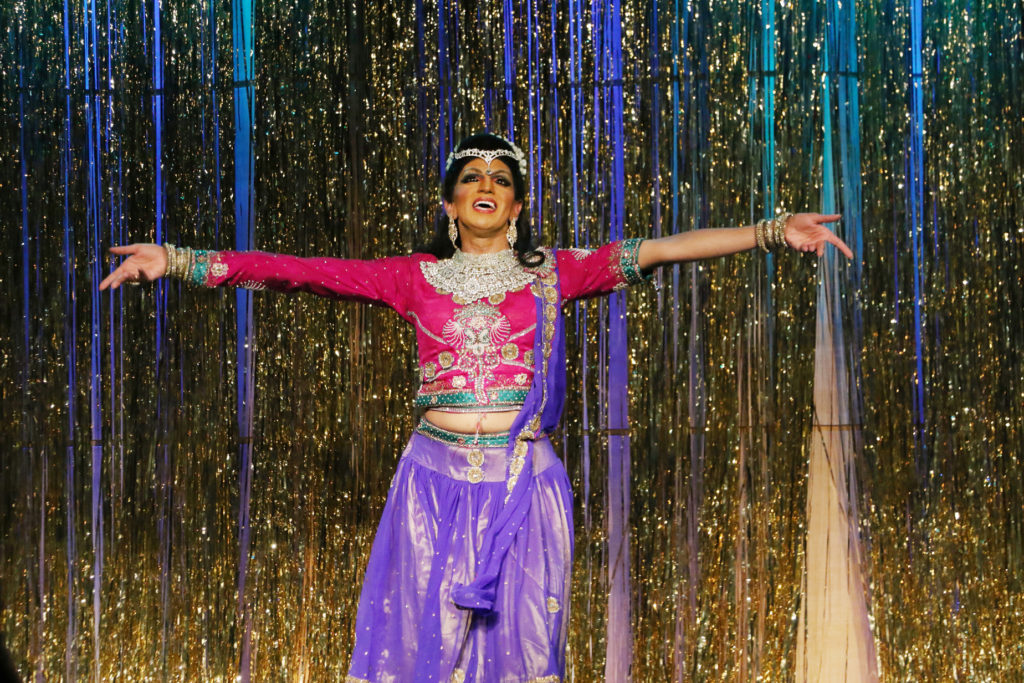17,508 people reached on Lassi with Lavina FB page – 1384 engagements
Shahana Sen, Bhagwan Adhikari and 40 others like it on Lassi with Lavina FB page
2386 views on LinkedIn – 46 Likes
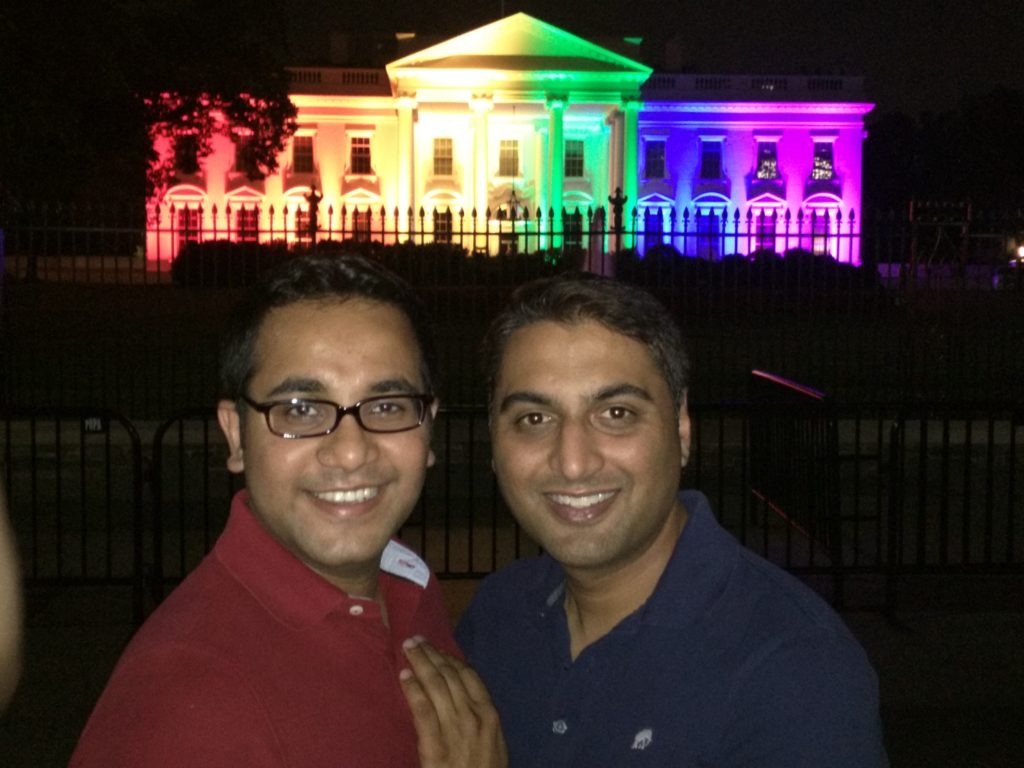
Goodbye 377! Desi LGBTQ Love Stories
[dropcap]T[/dropcap]his March there will be a big fat Indian wedding in Texas but there will be no bride. These nuptials mark the joining of two happy bridegrooms – Vaibhav Jain and Parag V. Mehta. Jain, MPH, is a research associate with the American Institutes for Research and Executive Board member of the South Asian Public Health Association. Mehta is a senior vice president at Mastercard, and is the former chief of staff and senior advisor to the 19th US Surgeon General at the U.S. Department of Health and Human Services.
A big beautiful wedding with Hindu priests, feasting and family is planned.
Section 377 for them is now like a distant bad dream, forgotten on awakening.
Indians in America are by no means homogenous – they are a diverse, multi-layered community – red, blue, rich, poor, middle-class, straight, gay and every other permutation you can think of. The recent overturning of Section 377 in India has many reactions from New York’s South Asian LGBTQ community.
[dropcap]V[/dropcap]aibhav Jain recently spoke at a gathering hosted by WNYC reporter Arun Venugopal whose radio program Micropolis gives voice to New York’s diverse communities. The evening marked the death of 377 with thoughtful introspection on what this means for the LGBTQ community in India and the US, with Gayatri Gopinath, Director of the Center for the Study of Gender & Sexuality at NYU, public health advocate Vaibhav Jain and psychologist Dr. Riddhi Sandil.
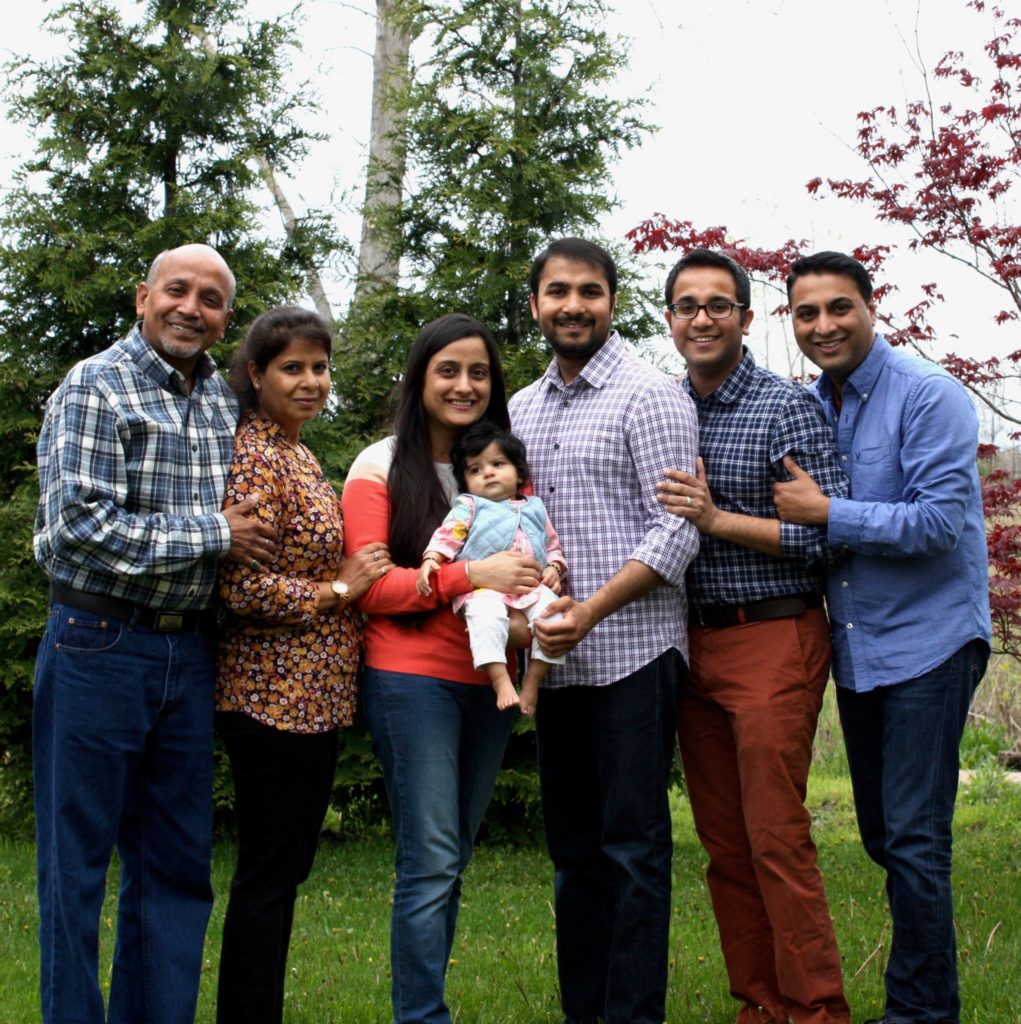
[dropcap]J[/dropcap]ain was a 25-year-old dentist in India, constantly living a dual life and compelled to invent fake girl-friends to placate society. Like many other gays and lesbians, he was driven out of the country by the presence of 377. He came to the US in 2011 and came out to his family five years ago. He says, “I can now be who I am and stop leading a dual life.”
I asked Jain how his life was different from that of his fiancé Parag Mehta, who grew up in the US. He says: “Yes, my struggles in India growing up as a gay man were real and often very painful. Parag grew up on the other end of the world in a small town in Central Texas but his experience and struggles were definitely comparable to my own, if not more. For him, growing up as a brown immigrant kid in a white town was a constant struggle of identity. Adding the layer of being a closeted gay guy in a conservative household just made things even harder for him.”
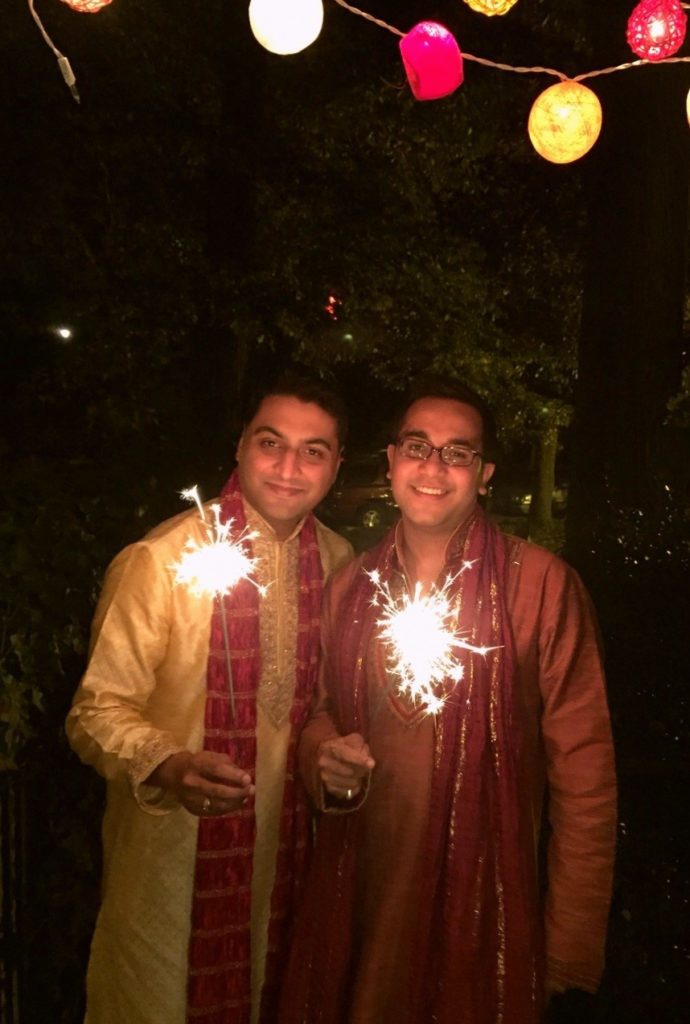
[dropcap]L[/dropcap]ife is about to change memorably for both of them in end-March when they will be bridegrooms at their wedding in Killeen, Texas. Says Jain, “We are blessed to have the love and support of both sets of our parents as we start a new chapter in our lives. Many of my family members are also flying in from India – including my parents- to bless the occasion and join the celebrations. We’re expecting about 400-500 people, so logistics have been quite a nightmare.”
The wedding festivities will start with a Garba/Sangeet night followed the next day with a traditional Indian wedding with two baraats. The actual ceremony will be an amalgamation of religious rituals, topped by an American reception. Needless to say, all three events will have lots of delicious Indian food and Bollywood beats.
The fact that 377 has been struck down has important repercussions for the lives of Vaibhav Jain and Parag Mehta. As Jain puts it so poignantly, “For the first time, in a very long time, I felt that my country has finally accepted me. Accepted me for who I am, regardless of who I love. Striking down of this law is significant not just for me or Parag, but for every gay boy and lesbian girl growing up in small towns across the country who are still facing discrimination and bigotry at schools or colleges, place of work or worship, at home or with friends.”
Meet Lal Batti and Sundari the Indian Goddess: New York’s Drag Queens
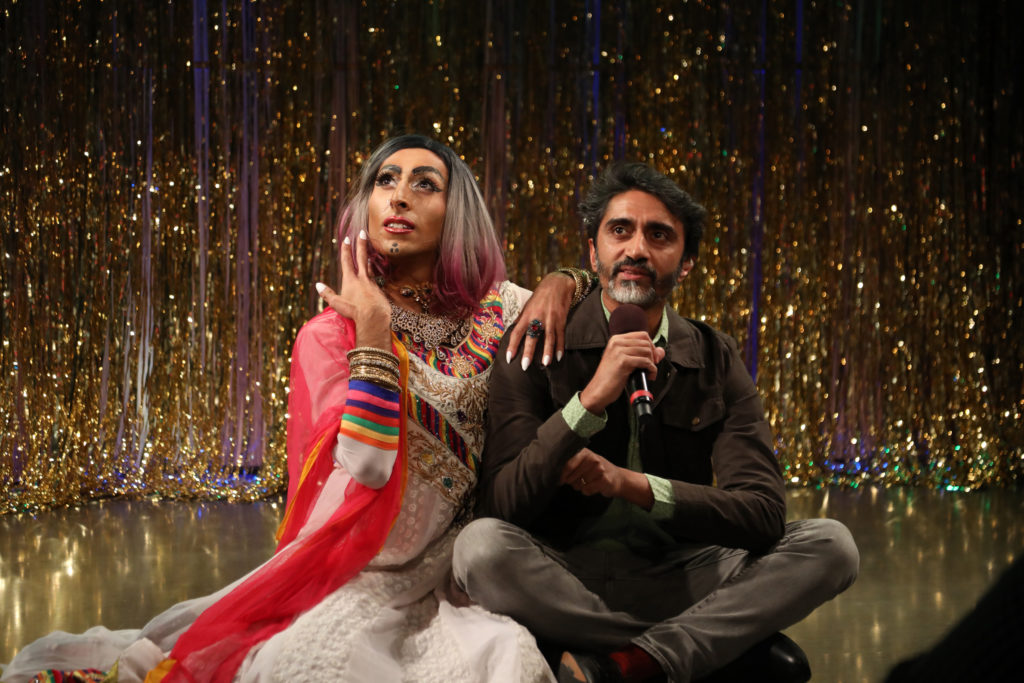
[dropcap]W[/dropcap]hat do Indian-Americans look like? Like any other community, they are a diverse bunch which comes in all sizes and colors. You have met the doctors, the engineers, the academics, the motel-owners. Now meet two sparkling desi drag queens who are making waves in the Big Apple: Lal Batti and Sundari, the Indian goddess. Both graceful and boisterous by turns, they have shown drag to be an art form and launched into the fascinating back story of male dance in India at the Micropolis event.
One of the classical dance numbers from Bollywood is Pyar kiya To Darna kya – from Mughal-e-Azam and Samir aka Lal Batti performed this with verve and energy. She explained, “I have loved, so why should I be afraid? When God can see what we are doing, then who is there to stop us? This pertains very much to the time we are in.” Lal Batti with her immaculate makeup and jewelry exudes a sense of confidence and joi de vivre which is very catching and her vibrant Bollywood dance moves appeal to all cultures. She has a full schedule of performances lined up at desi and mainstream parties and is quite the diva. Asked the secrets of being a great drag queen, Lal Batti replied: “Having fun! If you’re not having fun, no one else in the audience is!”
[dropcap]S[/dropcap]undari the Indian Goddess who is of Guyanese descent and adept at Kathak, Oddisi, Bollywood, Bhangra and Chutney, performed numbers from ‘Umrao Jaan’ and ‘Ram Lila’. An ardent advocate for LGBTQ causes, she observes that males cross-dressing and dancing as females was nothing new in India and had been happening for centuries: “This is not new – it’s been happening for generations. Dance helped me to discover myself. It’s such an important thing for us to learn and teach our youngsters – it’s important when they see someone even dressed as transgender to respect that person in how they look in that moment and time.” She explained how Guyana still has the equivalent of 377 and people can be criminalized and jailed there because of their sexuality. She felt the dismantling of 377 was not only liberation for India but also inspiration for other South Asian and Caribbean countries, and makes her feel very proud of her Indian heritage.
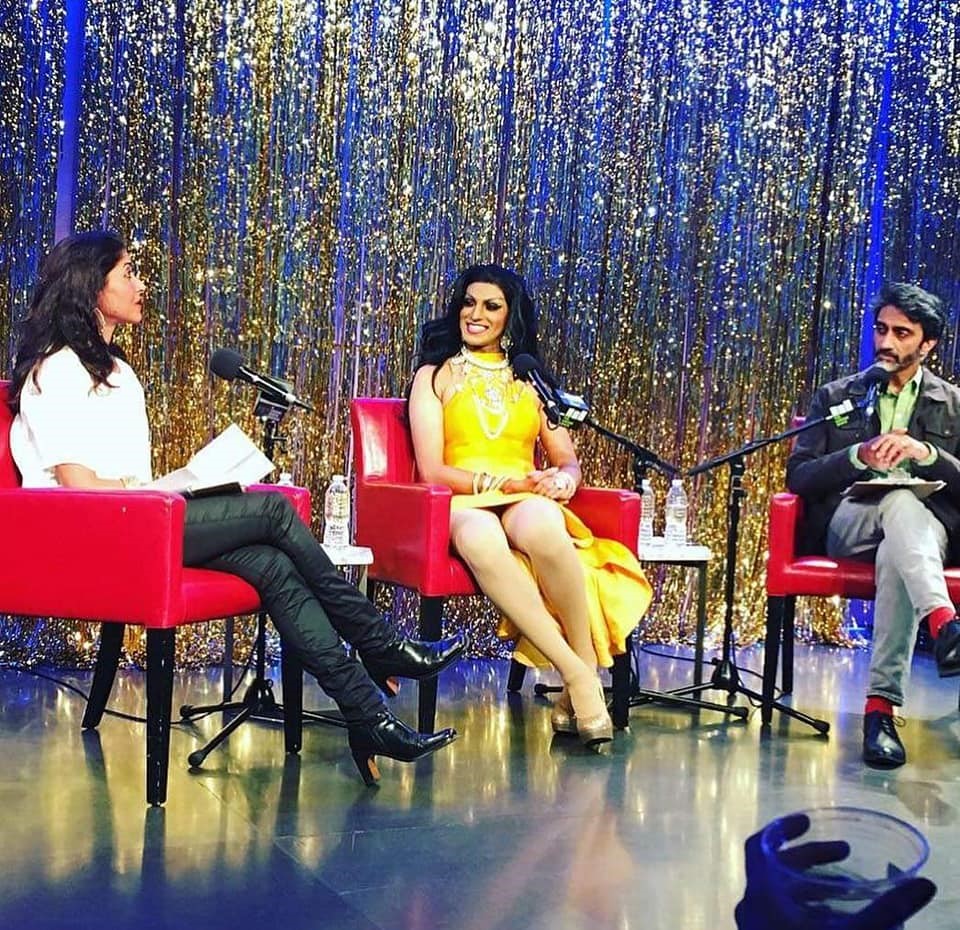
[dropcap]G[/dropcap]ayatri Gopinath, Director of the Center for the Study of Gender and Sexuality at New York University, has lived in New York since the 1990’s and was actually the first female member of the South Asian Gay Association (SAGA) which with her induction changed its name to SALGA. She has seen the trials and triumphs of the South Asian LGBTQ community and how it has forged relationships across diverse communities rooting for progressive values.
She says about the dismantling of 377, “It constitutes a larger moment of decolonization. The struggle for queers in post-colonial society has been the charge that our queerness is inauthentic – it’s not culturally authentic. But it’s not queerness that is inauthentic – it’s homophobia that is inauthentic. What’s been imported is, in fact, homophobia through 377 and through the British laws.”
(This article was first published in my column India in America in CNBCTV18.com)
Related Articles:
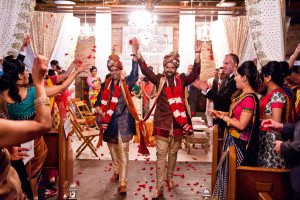
#Gaypride

